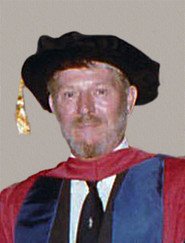

Mr Pro-Chancellor, the Second World War caused much that was unexpected, and much that went against nature. It brought death and destruction, it divided nations, it divided families. Even for a schoolboy, like Keith Legg, it brought dismay. For he was - to use the word of the period - "evacuated", sent away from home to a school in Wales, far from the London bombs. Human nature, which seems to make the problems of war possible, has a related tendency to resist their solution. At the height of another war in Ancient Greece, the great comic poet, Aristophanes, wrote a play called Peace, in which he imagined a happy but farcical series of talks to settle disputes and end the war; the talks which Aristophanes, depicts could not always have been called "useful and constructive": faced with the possibility of a reasonable solution in the interests of all the parties, one of Aristophanes' characters said: (roughly translated) "You might as well try to make a crab walk straight".
In that war closer to our own times, the schoolboy Keith Legg, in spite of success in his studies, insisted on cutting them short so as to be able to return home and be with his family at a time of crisis. This was a schoolboy's forthright solution to the problem he then faced. So for all the scepticism of that character of Aristophanes, human nature does have a capacity to solve problems, even those of our own making.
From that time, Mr Pro-Chancellor, Keith Legg's life has been devoted to problem solving of one kind and another, both in ordinary life and on the shop floor, both as an academic and as an administrator.
He began with flying. And how unnatural it is for human beings to fly in machines heavier than air, especially at speeds faster than sound, that is, Mr Pro-Chancellor, so fast that I could arrive at your feet faster than the words I am now speaking can reach your ears: this reality of flight is in truth immensely more unlikely than Aristophanes' fancy of the crab walking straight.
It was the problems of flight with which Keith Legg was concerned for a large part of his career, both practically and theoretically. He had a long stint working for Short Brothers and Harland in England and Northern Ireland; he then became Chief Designer at the Brazilian Aeronautical Technical Centre.
After this, new kinds of problem began to occupy him. He became Head of the Department of Transport Technology at the University of Loughborough, Director of Lanchester Polytechnic, and of course - most lately - Director of Hong Kong Polytechnic, so we see him confronting problems of family loyalty, the technical problems which were presented in Short Brothers, the cultural and linguistic problems of his work in Brazil (after a short time, he was lecturing to his students in Portuguese), the educational problems of Loughborough, the administrative problems of Lanchester and Hong Kong. And he has confronted all these problems with essentially the same inventive and forthright style of the schoolboy returning from safe Wales to be with a family in hazardous London.
It is not surprising that such a man, devoted to problem solving in all spheres, in the best tradition of engineering, should have found a wider call on his time, from the OECD, from UNESCO, the British Council, and from a variety of technical and educational institutions. Nor is it surprising that in Hong Kong, the Board of Education, the Examinations Authority, the Productivity Council, the Vocational Training Council, the Advisory Committee on Diversification, and numerous other technical and charitable bodies should have sought - and obtained - his advice. Nor is it surprising to find that since 1977 he has been a pioneer in establishing relations between educators in Hong Kong and their counterparts in the People's Republic of China. Nor indeed is it surprising that he should have led the Hong Kong Polytechnic through a remarkable period of growth to a point where many more than 20,000 students can study a whole variety of subjects by different modes of study, from the many different kinds of professional qualification up to degree level work in Combined Mathematics and Science, Computer Studies, Electronic Engineering, Mechanical Engineering, Social Work, with more to come. It is useful for us, Mr Pro-Chancellor, to confront Keith Legg. For we who wish to honour him compose a University, apparently a quite different tradition of work. We are reputed to regard such work as his as mechanical. We are supposed to occupy an "ivory tower", to see work other than ours as belonging to artisans, and to see other problems as requiring little imagination for their solution. Mr Pro-Chancellor, in honouring Keith Legg, we repudiate this view. His whole career in the workshop, the classroom, the University, the Polytechnic, displays the force of imagination which is the hallmark of the engineer and problem solver, as much as of the literary critic, the mathematical physicist, or the philosopher.
Keith Legg has always moved from one challenge to another, but establishing a proper place for his sort of work in tertiary education in Hong Kong with energy, with determination, with imagination, this has been his great task of in the last decade. And now he moves on. Can we teach a crab to walk straight? I guess that Keith Legg might have some ideas about how to do it.
Mr Pro-Chancellor, for his leadership of Hong Kong's first Polytechnic, I present to you Dr Keith Legg, OBE, JP, educator and problem solver, for the award of the degree of Doctor of Laws honoris causa.
Citation written and delivered by Professor Francis Charles Timothy Moore, the Public Orator.



